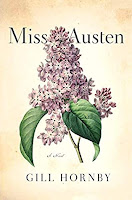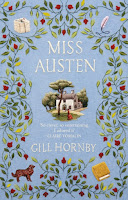Book
Description
Whoever
looked at an elderly lady and saw the young heroine she once was?
England,
1840. Two decades after the death of her beloved sister, Jane, Cassandra Austen
returns to the village of Kintbury and the home of her family friends, the
Fowles. In a dusty corner of the vicarage, there is a cache of Jane’s letters
that Cassandra is desperate to find. Dodging her hostess and a meddlesome
housemaid, Cassandra eventually hunts down the letters and confronts the
secrets they hold, secrets not only about Jane but about Cassandra herself.
Will Cassandra bare the most private details of her life to the world, or
commit her sister’s legacy to the flames?
Moving
back and forth between the vicarage and Cassandra’s vibrant memories of her
years with Jane, interwoven with Jane’s brilliantly reimagined lost letters,
Miss Austen is the untold story of the most important person in Jane’s life.
With extraordinary empathy, emotional complexity, and wit, Gill Hornby finally
gives Cassandra her due, bringing to life a woman as captivating as any Austen
heroine.
The
Miss Austen of the title of this book is Cassandra Austen, Jane’s elder and
only sister. What do we know about Cassandra? Well, we know that she and Jane
were extremely close, sharing a bedroom when at home. They were best friends
and confidants. When Jane Austen died, Cassandra wrote a letter to their niece,
Fanny, which contains the following, which never fails to bring a tear to my
eye:
I have lost a treasure, such a sister, such a friend as never can have been surpassed. She was the sun of my life, the gilder of every pleasure, the soother of every sorrow; I had not a thought concealed from her, and it is as if I had lost a part of myself.
We
know that Cassandra, too, never married. She was engaged in her youth to Tom
Fowle, who was hoping to become a clergyman, but he died abroad before they
could marry.
Another
well-known fact is that Cassandra Austen destroyed and redacted a lot of Jane’s
history. She cut bits out of some letters and burned many others.
Miss
Austen picks up with
Cassandra in her late 60s. In this book she not only intends to destroy the
letters that Jane wrote to her, but also those that she wrote to other people,
if she is able to get her hands on them. She has travelled to the home of Tom
Fowle’s brother. He has recently died and Cassandra, ostensibly there to help
his daughter prepare to vacate the house, instead is hoping to track down the
letters that Jane would have written to her friend, Mrs Eliza Fowle. Cassy is
successful in locating the letters, and as she reads them, we are taken back in
Cassy’s mind to her younger days, the times that Jane is writing about.
Gill
Hornby puts forward two main motivations for Cassandra’s actions. Firstly, she is trying to preserve her sister in as positive
a light as possible, believing that Jane’s work will continue to excite
interest in the future:
Cassandra was the executor of her sister’s estate: the keeper of her flame; the protector of her legacy. In the time that was left to her, she was determined to find and destroy any evidence that might compromise Jane’s reputation.
The
fact that she needed a bonfire to destroy the amount she censored makes you
wonder how much of Jane’s correspondence and manuscripts contained evidence of
her wicked wit!
 |
| Miss Cassandra Austen |
She pictured her sister-in-law Mary reading them, spreading the contents, passing them on. She imagined the next generation examining her own traces as if she were a South Dorset fossil.
I
thought this story was beautifully done. I loved the intermingling of the facts
that we know with an imagining of the lengths Cassandra might have gone to in
order to edit the evidence of Jane’s personality and past. I loved the
flashbacks to years gone by when Cassandra remembered the events from Jane’s
life and her own that she was trying to suppress. The flashbacks range from
Cassandra’s engagement in 1794 to Jane’s death in 1817.
I
particularly enjoyed the excerpts from Jane’s letters (the ones that Cassandra
planned to burn). Enough of Jane Austen’s letters exist for us to have a
flavour of her style. She wrote very amusing letters, and I felt that the
author did a great job of making the letter seem like something Jane might have
written, such as this one, on her first impressions of Bath:
In the meantime, we have been here three days and I have yet to meet a gentleman below the age of one hundred.
I
found the story really touching, seeing Cassandra’s devotion to her sister, and
preserving her privacy and her legacy. I feel that this part at least probably
reflects reality, as it’s an agreed fact that Cassandra actively destroyed a
lot of documents. I also found the story a little sad, as in this rendition at
least, Cassandra lets chances of personal happiness pass her by partly in order
to prioritise her sister’s happiness. Whether or not that was the case, I don’t
know, but it made me sad to think of it, particularly as the two things needn’t
have been mutually exclusive.
Like
many people, previously I felt it was a shame that Cassandra had purged so much
of the documentation that would have made it possible for us to learn more
about Jane Austen. This story gives a personal touch, portraying how that idea
might have felt to somebody who didn’t see Austen as the commodity of a great
author, but wanted to protect her as a person and ensure that her private life
didn’t become public record.
These are the things by which most of us are remembered, these small acts of love, the only evidence that we, too, once lived on this earth. The preserves in the larder, the stitch on the kneeler. The mark of the pen on the page.
I
thought this story was wonderful, and I would heartily recommend reading it. Big
fat 5 stars from me.
*My
thanks to Flatiron Books, who provided me with a copy of this book for my
honest review.
I
understand that this book has been optioned for a movie, which is very
exciting. Let’s hope it comes to fruition!
Author
Bio
Gill
Hornby is the author of the novels The Hive and All Together Now, as well as
The Story of Jane Austen, a biography of Austen for young readers. She lives in
Kintbury, Berkshire, with her husband and their four children.
(When
I looked up Gill Hornby’s bio to add to this blog post I realised that she has
some famous literary connections – she is married to novelist Robert Harris and
her brother is Nick Hornby. Whaaaaat?!
Also,
she lives in Kintbury, where much of Miss Austen is set, as it’s where the Fowle
family lived. Double Whaaaaaaat?!)
Buy
Links
 |
| US Cover-++ |
Why
not add it to your Goodreads shelf?
Note
Regarding Comments: I love to read your comments, but a few blog visitors have
reported difficulties in commenting, particularly while using the Safari browser. If you are
unable to comment, please try using another web browser, such as Google Chrome,
or please contact me and I will add your comment for you :)
* * *
If you don’t want to miss any of my future posts, please subscribe:
If you'd like to be friends on Goodreads then please invite me - just say that you visit my blog when it asks why you'd like to be friends with me.
If you'd like to be friends on Goodreads then please invite me - just say that you visit my blog when it asks why you'd like to be friends with me.




I just got given this for Mother's Day today, can't wait to read it! And would definitely see it if it was made in to a movie!
ReplyDeleteI think it would work really well on screen. I hope it gets made!
Deletewonderful review!
ReplyDeleteThanks so much, Denise!
DeleteI thought this version of Cassandra's story was just lovely. Glad to see what you thought, Ceri.
ReplyDeleteI did too! Thanks so much for commenting, Sophia.
DeleteI have not read this but would like to do so. Thanks for sharing here.
ReplyDeleteI hope you enjoy it if you read it. It's well worth a read in my opinion :)
DeleteSo very glad to hear your praise for this story, Ceri!! And I don't think I heard about the movie option...that would be so fantastic!!
ReplyDeleteIt would be fantastic, if it happens!
Delete